 MyDogBreeds
MyDogBreeds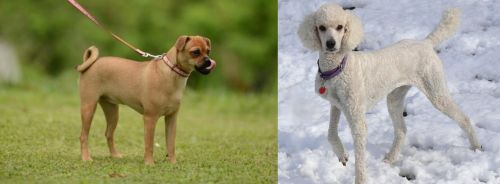 Muggin is originated from United States but Poodle is originated from Germany. Muggin may grow 31 cm / 12 inches shorter than Poodle. Muggin may weigh 12 kg / 26 pounds lesser than Poodle. Both Muggin and Poodle has same life span. Both Muggin and Poodle has same litter size. Both Muggin and Poodle requires High maintenance.
Muggin is originated from United States but Poodle is originated from Germany. Muggin may grow 31 cm / 12 inches shorter than Poodle. Muggin may weigh 12 kg / 26 pounds lesser than Poodle. Both Muggin and Poodle has same life span. Both Muggin and Poodle has same litter size. Both Muggin and Poodle requires High maintenance.
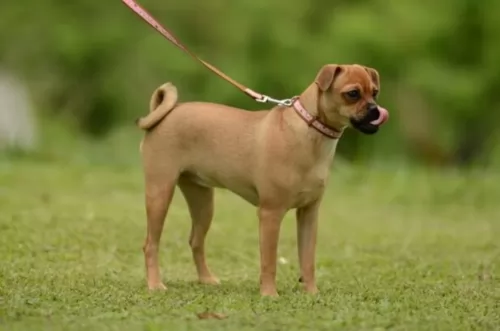 The Muggin is not a purebred dog but rather a cross breed. The hybrid dog population has exploding in the United States in the past ten to fifteen years. A lot of the success of crossbreeding can be attributed to the marketing of these dogs as “Designer Breeds”.
The Muggin is not a purebred dog but rather a cross breed. The hybrid dog population has exploding in the United States in the past ten to fifteen years. A lot of the success of crossbreeding can be attributed to the marketing of these dogs as “Designer Breeds”.
Designer breeds are developed because someone wants some of the characteristics of Breed X and some of the characteristics of Breed Y. Therefore, Designer breed XY is developed. In order to understand this hybrid dog, you need to understand the two purebred breeds they come from. The Muggin is the result of crossing the purebred Pug and the purebred Miniature Pinscher or Min Pin. So, we need to look at the origins of these two purebred breeds.
They are also referred to as Pin Pugs, Min Pin Pug, Pug Pin, Pugscher and were originally the Carlin Pinscher. However, these days there are other breeds besides the Pug and Min Pin making up the gene pool for the Carlin Pinscher. Because of this the Muggin has been separated from the Carlin Pinscher. The American Canine Hybrid Club has accepted the Muggin name for the Pug Min Pin cross.
Pugs are originally a Chinese breed and they were companions rather than working dogs of any kind. During the Han Dynasty they were the dogs of royalty. At the same time there were dogs very much like the pug in Japan and Tibet. The Pugs came to Europe by way of trades with the Dutch who then brought them to Europe. They were named the Mopshond and they caught the eye of the royalty in Europe as well.
Pugs were imported to the United States after the U.S. Civil War and in 1885 they were recognized by the American Kennel Club and called Pugs.
The Min Pin traces its origins to Germany a few hundred years ago. They were “ratters”, guarding the house and stables from all types of vermin. Most dog people believe that the Min Pin is much older than this, perhaps by thousands of years. Yet there is no detailed history to support that. Most believe the breed comes from the German Pinscher line. There might also be some Daschund and Greyhound in that line.
They were once called the Reh Pinscher. This was their name when they came to North America in 1919 and then the breed was renamed in 1972. The Miniature Pinscher Club of America was started in the early 1900’s while the AKC recognized the Min Pin in 1929. Today the Miniature Pinscher is a family dog, a companion.
The Muggin is a loving and loyal dog. All they want is for you to be happy and to share that happiness with them. They can also easily become a one person dog and bond intensely with that one person. They are not a hybrid that you can leave home alone while you go to work for 8 to 10 hours a day. No, the Muggin needs attention and lots of it. Despite this they are great with both kids and other dogs.
Because they are a cross breed, they are not recognized by the American Kennel Club. However, some hybrid registries do recognize the Muggin. These include the Designer Breed Registry, the International Designer Canine Registry, The Designer Dogs Kennel Club, the American Canine Hybrid Club, and the Dog Registry of America.
 Poodles are said to be older breed which is developed to hunt waterfowl. They have their origin in Germany and developed as a breed in France. Many different arguements are there in their development. One of the arguement says that they are developed as a result of crossing European Water dogs. Egyptian and Roman histories have proof of Poodles in their drawings and statues. They were categorized into three types according to their size and are Miniature, Toy and Standard.
Poodles are said to be older breed which is developed to hunt waterfowl. They have their origin in Germany and developed as a breed in France. Many different arguements are there in their development. One of the arguement says that they are developed as a result of crossing European Water dogs. Egyptian and Roman histories have proof of Poodles in their drawings and statues. They were categorized into three types according to their size and are Miniature, Toy and Standard.
 As previously mentioned, the Muggin is a cross between the Pug and the Miniature Pinscher. They are small, shave sturdy legs, floppy ears, and a wrinkled forehead for the most part. Like all hybrids however, all first generation dogs do not look the same. Some might resemble the Min Pin more and others the Pug. Some might have the stockier body of the Pug and the short tail of the Min Pin. Or one could have the Pug’s curly tail and the athletic body of the Min Pin. The snout can be short or long, the ears heavy and floppy or small and thin.
As previously mentioned, the Muggin is a cross between the Pug and the Miniature Pinscher. They are small, shave sturdy legs, floppy ears, and a wrinkled forehead for the most part. Like all hybrids however, all first generation dogs do not look the same. Some might resemble the Min Pin more and others the Pug. Some might have the stockier body of the Pug and the short tail of the Min Pin. Or one could have the Pug’s curly tail and the athletic body of the Min Pin. The snout can be short or long, the ears heavy and floppy or small and thin.
Their coats will usually be fine and short, and colors can vary a lot. They might be black and tan like a Min Pin, or more like a Pug with a solid color of cream, brown, black, white or golden. They also tend to shed quite a bit no matter which parent they take after the most. They will either have brown noses and black eyes or brown eyes and black noses or any combination of black and brown.
If Muggins are only bred to Muggins the second and third generations will resemble each other more than the first generations will. However, at this point many breeders will try to strengthen the breed by occasionally adding in to the gene pool other dog breeds.
 Poodles today lives a luxury life but actually they are bred to do work. They are well known for their intelligence and are really water retriever. This is because they show their energy in hunting waterfowl. The name Poodle is said to got from German word "Pudel" which means "splash in the water".
Poodles today lives a luxury life but actually they are bred to do work. They are well known for their intelligence and are really water retriever. This is because they show their energy in hunting waterfowl. The name Poodle is said to got from German word "Pudel" which means "splash in the water".
Their hair is trimmed in such a way to make them swim easily. Hair is not trimmed in the joints and organs such that to protect them from cold water. Poodles are well known for their wonderful personality and intelligence. Also they are very obedient and a good companion. They won't be happy if left alone for a long time. Poodles are interested in playing games with people. They perform very well if given a proper training. Good manners should be taught to them as they remember all things they have learned.
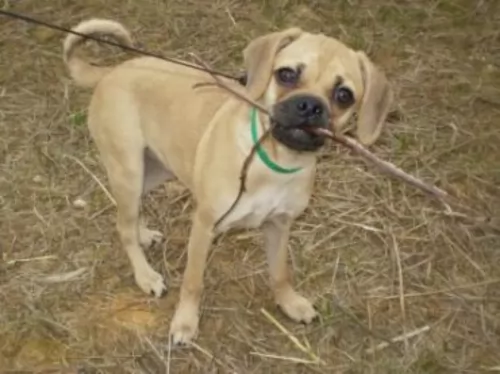 They are good with children but should be supervised.
They are good with children but should be supervised.
Energetic and loving little dogs.
Very adaptable if taken for walks or has space in a yard. Can live anywhere under those circumstances.
Very intelligent but strong willed dog. Needs strong leadership from their person.
 They are good companions and usually likes to spend time with children. Even they are children friendly it is strongly recommended not to leave children alone with them.
They are good companions and usually likes to spend time with children. Even they are children friendly it is strongly recommended not to leave children alone with them.
Poodles are specialist in hunting water birds. They are good in swimming since they are covered with fur water will not easily get into their ears. They are well known for their intelligence like humans.
They are well suited for apartment living but won't be happy if left alone. They will tolerate hot weather better when compared with cold.
They are quick learners and learn good and bad things very quickly. Once they learn, they won't forget it up. Since poodles are so intelligent they are very easy to train.
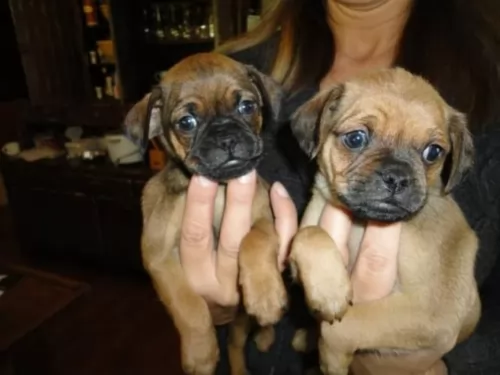 The first generation of Muggins may face all the health issues of either or both their parents, while second and third generations tend to have less health issues, They types of issues the first generation of Muggins might face include:
The first generation of Muggins may face all the health issues of either or both their parents, while second and third generations tend to have less health issues, They types of issues the first generation of Muggins might face include:
Nerve Degeneration – Degenerative Myelopathy or Dm – causes paralysis and eventually fatal.
 Poodles have more chances for getting eye diseases such as Progressive retinal atrophy and cataracts. Cancer is also seen in them and there are chances of skin problems such as allergies and tumors.
Poodles have more chances for getting eye diseases such as Progressive retinal atrophy and cataracts. Cancer is also seen in them and there are chances of skin problems such as allergies and tumors.
Usually poodles don't shed at all. Excessive shedding is the smptom of allergies in them. When they get other problems shedding accompanies with it. Even an infection may cause hairfall. Ringworm infections and pests should be controlled using appropriate medicines.
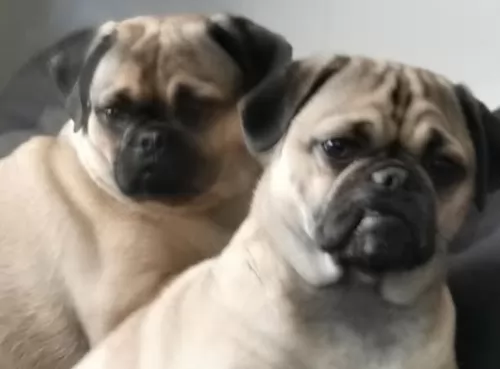 This crossbreed has a definite propensity to overeat and become obese from puppyhood. Feed the puppy a small dog dry food 3-4 times a day a total of ¾ of a cup to 1 cup.
This crossbreed has a definite propensity to overeat and become obese from puppyhood. Feed the puppy a small dog dry food 3-4 times a day a total of ¾ of a cup to 1 cup.
Again don’t over feed the adult Muggin or he will become obese easily. Feed at least twice a day one to one and half cups total.
High Energy
With the athleticism of the Min Pin taking precedence over the less active Pug, the Muggin is a fairly active dog. The Muggin is also not effective by the Pug’s difficulty with heat and cold. They love to go on long walks and need exercise to keep from being bored and destructive. However, remember there is a Pug in your Muggin and if she is not into exercise don’t try to get her to do more than she can.
You do want your Muggin to get enough exercise to fend off any tendency to be overweight. They are good at agility, jogging, obedience and watchdog activities.
 Usually puppy eats more food than an adult dog. This is because they need more food to support growth. Actully puppies need two to four times more food than adult. Puppies should eat in such a way that their ribs should not be seen and waist must be visible.
Usually puppy eats more food than an adult dog. This is because they need more food to support growth. Actully puppies need two to four times more food than adult. Puppies should eat in such a way that their ribs should not be seen and waist must be visible.
Poodles can be fed with proteinous food, healthy grains, vegetables and fruits. They love to eat organs such as liver, kidney, brain and chicken breast, turkey and fish. Vegetables such as baby carrots, spinach and peas can be given to them. Make them to eat fruits like raspberries, banana and melon.
Dry kibble is not good for their teeth. Even some premium quality foods are not good for their health. Pig's ears are not safe to chew for them. Vaccinations should be made at the right time.
Exercises play an important role in their health and even extend their life. Poodles should be made to walk regularly. Exercising must be done to a particular level and they should not be over exercised.